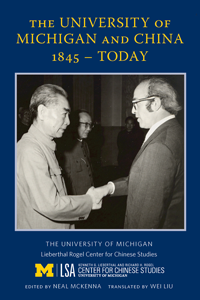
The University of Michigan and China 1845-Today
Skip other details (including permanent urls, DOI, citation information): This work is licensed under a Creative Commons Attribution-NonCommercial-NoDerivatives 3.0 License. Please contact [email protected] to use this work in a way not covered by the license.
For more information, read Michigan Publishing's access and usage policy.
Michigan and China: The Twenty-First Century
As Chinese student enrollment has steadily increased at the University of Michigan, and interest in China has continued to flourish throughout many academic disciplines, the university has persisted in building a strong and mutually beneficial relationship with Chinese institutions.
In the summer of 2005, former U-M President Mary Sue Coleman traveled to China and signed a series of agreements of cooperation with Chinese universities. President Coleman’s trip to China confirmed that one of the university’s major commitments is to establish, expand, and enhance the university’s partnerships in China so that Michigan faculty, staff, and students can benefit from new cooperative ventures with Chinese colleagues and institutions.
At the same time, the University of Michigan has much to offer to China’s growing public and private sectors—especially the country’s higher education institutions—in terms of expertise and experience. During former President Coleman’s 2005 trip to China, she met with officials from the Chinese Ministry of Education, who requested that Michigan host a two-week forum for Chinese higher education leaders on the management of world-class research universities. The Michigan-China University Leadership Forum convened in May 2006, May 2008, and again in May 2010 in Ann Arbor. The meeting brought together Michigan faculty and administrators and Chinese educational leaders representing universities across China and officials from national educational agencies.
In the 2007–2008 academic year, the College of Literature, Science, and the Arts and the Center for Chinese Studies organized a Theme Year focusing on China and its place in an era of intensified globalization. Around the same time as the China Theme Year, then University President Mary Sue Coleman commissioned the China Task Force to examine the university’s long-standing connection with China. Although this study had a distinctly regional focus, the university’s many varied connections to universities, organizations, and people in China made it a broad university undertaking. In 2008, the task force submitted its report on how to strengthen ties with Chinese institutions. One of the key recommendations by the task force—development of intellectual assets and collaborations in the arts—has already resulted in the establishment of the Confucius Institute at the University of Michigan (CI-UM) to promote China’s arts and cultures.
In 2012, alumna Jiu-Hwa Lo Upshur (a recipient of the Barbour Scholarship) established the Chia-Lun Lo Fellowship to support University of Michigan PhD students from Taiwan in her -father’s name; upon the establishment of the scholarship, she and Janet Weiss, then Dean of Rackham Graduate School, met with former Taiwanese President Ma Ying-Jeou in an acknowledgment of the scholarship and her -father’s legacy.
Two years later, as part of a larger gift to the University of Michigan, Richard and Susan Rogel gave an endowment gift to the Center for Chinese Studies. Mr. Rogel chose to recognize his longtime friend, University of Michigan Political Science Professor Emeritus Kenneth Lieberthal; the two met and became friends on the 1993 trip to China led by then U-M President Duderstadt. In April 2014, the regents voted to rename it the Kenneth G. Lieberthal and Richard H. Rogel Center for Chinese Studies.
The generous philanthropy of Jiu-Hwa Lo Upshur and Richard and Susan Rogel also reflects the broadly increased support that the University of Michigan has received from alumni and friends with an interest in China. Gifts in support of student scholarships, faculty endowments, and academic programming have grown significantly, particularly since 2010. In addition, University of Michigan alumni communities across Greater China have grown in size and vibrancy over the past decade. Faculty and deans are regularly invited to speak at events in the region, thus deepening the already strong connections with Ann Arbor.
Continuing to underscore the importance of academic collaboration between the University of Michigan and its partners in China, former U-M President Coleman visited China again in 2010, and current U-M President Mark Schlissel made trips to China in 2015 and 2017. Underscoring the importance of the relationship between the University of Michigan and China was the fact that his trip to Beijing and Shanghai was President Schlissel’s first international trip as president of the university. His trip included an official meeting with the Vice Minister of Education, and he attended large alumni meetings in Beijing and Shanghai, as well as the signing of new memoranda of understanding with several leading Chinese universities.




